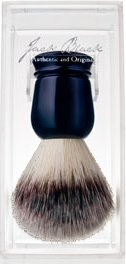 This morning, I tried a Jack Black® Pure Performance Shave Brush. Its bristles are synthetic (
This morning, I tried a Jack Black® Pure Performance Shave Brush. Its bristles are synthetic (the badger lives to see another day
) and anti-microbial, but designed to perform like a silver tip badger brush (which is generally held to be the best sort).
I have a Burma Shave™ boar-bristle brush that I got before I learned that boars were killed for the bristles, and an Art of Shaving® basic badger-bristle brush given to me as a gift before the giver learned that badgers were killed for the bristles. Jointly, these could last quite a few years. But I was quite interested to try a synthetic brush, partly so that I would know whether they were good gifts, and partly so that I could write and speak about them from experience.
The thing that I always read about most synthetics is that that they don't hold water as well as do natural
bristle brushes. Well, I've not yet done a head-to-head comparison with anything but the boar-bristle brush, but the Black® brush definitely holds considerably more water than does a Burma Shave™ boar-bristle brush. (So much so, in fact, that I ended-up with far more dilute lather than I wanted. That's a problem that I can easily address, by just shaking out the brush before I put it in the soap.)
The Black® brush also feels much nicer against my skin than does the boar-bristle brush, and certainly nicer than did the boar-bristle brush when it was new. And the boar-bristle brush smelled like a musky animal when it was new, whereäs the Black® brush naturally didn't. (Jack Black in fact gave it some sort of pleasant scent which I presume will wash away with use.)
I will probably, at some future point, try the genuine badger brush that I was given. The badger whence the bristles came isn't going to get any more killed; and, while I wouldn't thus have tested the Black® brush against a high-end badger brush, I would at least have tested it against a badger brush of some sort.
While I am on the subject of shave brushes, I would like to mention the Burt's Bees® Natural Bristle Shaving Brush, found in
their Bay Rum Men's Shaving Kit and sometimes sold separately. A little research confimed my suspicion that the bristles are boar bristles.
Burt's Bees proclaims
our goal is to help create a world where people have the information and tools they need to make the highest ethical choices
Now, reasonable people might argue over whether it's ethical to kill animals for shaving products, but one doesn't have the information needed to make the highest ethical choices if one isn't being told that these natural bristles were harvested from killed boars; plainly a significant share of Burt's Bees' customers would have concluded that the use of such bristles were unethical. And we may safely presume that the boars were killed (though there is a ranch in Spain that would happily sell them bristles sheared from boars who are not killed), because Burt's Bees, which makes a point of telling us that it doesn't engage in animal testing hasn't made a point of telling us that these bristles were sheared from live boars.
Possibly Burt's Bees just didn't know any better (much as I didn't know any better). I notice that the Bay Rum Men's Shaving Kit is presently listed as currently out of stock
, and I can't find the brush itself listed separately at their site (though I can find it sold by Red Rain, a company that claims to offer the concientious consumer earth friendly, cruelty free products and services
). But Burt's Bees has grossly failed its customers, either willfully or inadvertantly, and owes to them an explanation and an apology.



